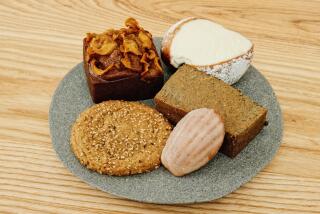Quiche Niche : Bakers Take Slow-Growth Path
- Share via
When Brad Kovar started selling his homemade quiche to restaurants and supermarkets, he was both delighted and overwhelmed by the orders that poured in. But his company, Glendora Quiche Co., almost fell apart because he couldn’t keep up with the burgeoning demand. Kovar was interviewed by Karen Kaplan.
*
For years, friends of mine had been telling me to put my quiche on the market. Finally I brought a sample to the owner of a small restaurant in Glendora. Lo and behold, he really enjoyed it. Then I started approaching other restaurants, and I was just blown away that they would place an order.
Within a few weeks, our orders tripled. Quiche isn’t the fastest or easiest thing to make, and my wife and I were spending our entire weekends in our kitchen. It got out of hand. So I quit my day job and found a commercial kitchen we could use during the off-hours.
With the increased capacity, we started selling to specialty supermarkets like Bristol Farms. After our success with them, we approached the larger grocery store chains like Ralphs and Gelson’s. Our experience with the restaurants really helped, because we had a track record for delivering the quiche on time.
I just feed on growth. When I got into Ralphs, I wanted to be in every store they could possibly give me. Then I was scared half to death when I was trying to fill those orders with the small amount of employees we had at the time. I was driving to 10 stores a week all over Southern California. That was more than I could handle.
Then I realized that each store expected me to make deliveries three times a week. The supermarkets had presumed that I knew that, but I didn’t. I just apologized and said I’d get the problem fixed real quick. I think it hurt our reputation very briefly until I was able to find a distributor.
The distributor sells your product to the store at wholesale prices, so we have to sell to them at less than wholesale. Then they take care of making deliveries to all the stores. You lose some money, but in the long run it pays off because you’re doing more volume.
After that we became more well-paced. Now we have our own kitchen with five commercial ovens and we can produce around 1,200 quiches a week. At certain times we’ll have a burst of sales activity and growth, followed by a stabilization. Now I manage our growth so we grow a little at a time. We won’t even go out and search for additional business until I feel confident that we’ve stabilized.
It’s certainly nice to be in a business with unlimited growth potential, but rapid, uncontrolled growth can be the kiss of death.
On his reaction to large orders from a supermarket . . .
“I was scared half to death when I was trying to fill those orders with the small amount of employees we had at the time.”
On how he keeps the pace of growth in check . . .
“Now I manage our growth so we grow a little at a time. We won’t even go out and search for additional business until I feel confident that we’ve stabilized.”
On the fallout from growing too fast . . .
“When you grow too fast, the first thing you lose is the customer service. When you’re growing, you want to keep your reputation intact.”
(BEGIN TEXT OF INFOBOX / INFOGRAPHIC)
AT A GLANCE
Company name: Glendora Quiche Co.
Owner: Brad Kovar
Nature of business: Produces quiches for restaurants and supermarkets
Location: San Dimas
Number of employees: 8
Annual sales: About $200,000
More to Read
Eat your way across L.A.
Get our weekly Tasting Notes newsletter for reviews, news and more.
You may occasionally receive promotional content from the Los Angeles Times.










